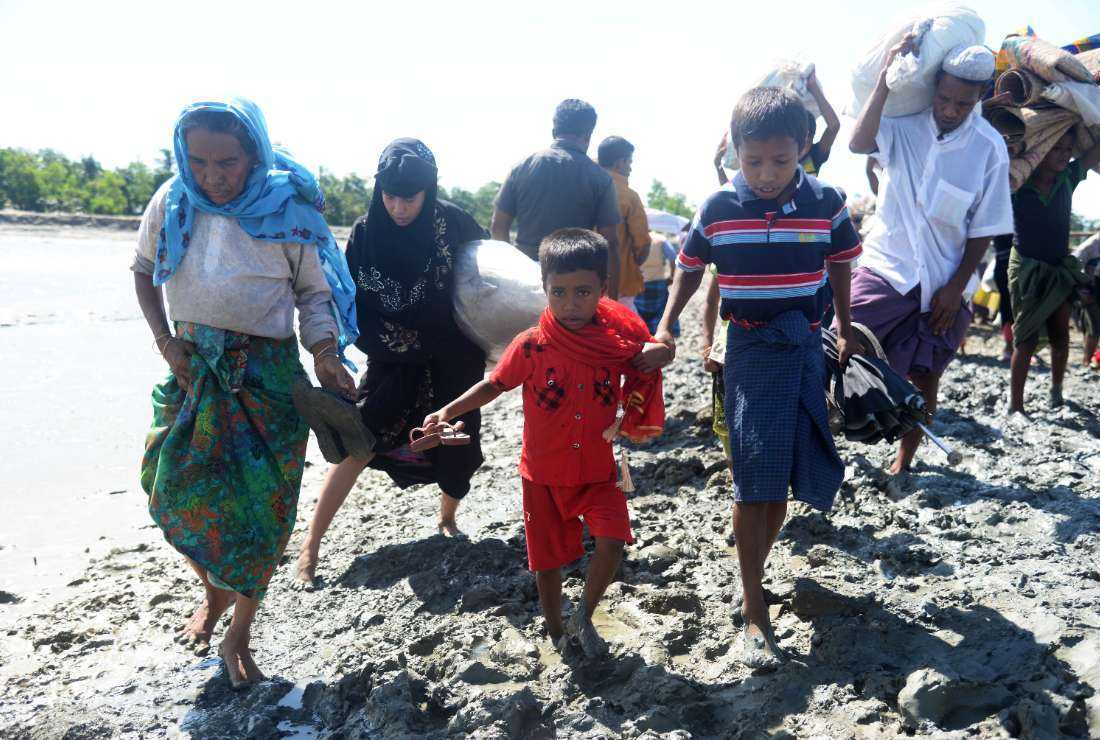
Stalled repatriation is causing frustration among the one million refugees and the host community, activist says

Rohingya refugees enter Bangladesh through Shah Porir Dwip area of Cox's Bazar following the military crackdown in Rakhine state of Myanmar in 2017. (Photo: Piyas Biswas/UCA News)
Thousands of Rohingya refugees rallied in Bangladeshi camps and chanted slogans with placards to demand repatriation to their homeland in Myanmar as they marked the fifth anniversary of a deadly military crackdown.
"We marked the 5th Genocide Remembrance Day today [Aug. 25]. On this day Myanmar military carried out genocide against us – our Rohingya brothers and sisters. We don't want to remain as refugees, we want to return to our Golden Arakan, our motherland,” Mohammad Jobair, the secretary general of the Arakan Rohingya Society for Peace and Humanity (ARSPH), told UCA News.
The organization led rallies in the camps of Cox’s Bazar in southeastern Bangladesh which houses nearly one million Rohingya Muslims, the majority of whom fled the 2017 military atrocities in Myanmar, which was dubbed “a textbook example of ethnic cleansing” by the United Nations. The United States recognized the brutalities as a “genocide.”
Rohingyas held placards with the slogan: “Hope is Home.”
Jobair said Rohingya refugees “urge the international community to put more pressure on the Myanmar government so that sustainable repatriation begins quickly."
Noor Hossain, a Rohingya Maulvi (religious teacher), delivered a speech during one of the rallies where he recalled how the Myanmar military persecuted Rohingya, destroyed their villages, and forced them to flee to Bangladesh.
He also demanded justice for the brutal assassination of Rohingya rights activist Muhib Ullah last year. Ullah was a former teacher who went on to become the chairman of ARSPH and the most popular community leader.
The military crackdown in response to attacks on security forces by the shadowy insurgent outfit, Arakan Rohingya Salvation Army (ARSA), triggered the exodus of more than 750,000 Rohingya to Bangladesh. The escapees joined another 250,000 Rohingya already in Bangladesh who fled earlier bouts of persecution.
The ARSPH estimates that 1.2 million Rohingya are living in Bangladesh as refugees including 30,000 in Bhasan Char, a coastal island in the Bay of Bengal.
Hamida Begum, 23, a Rohingya mother of one, is an employee of a charity group in the Balukhali refugee camp. She says Rohingya repatriation will not materialize without the strong and direct intervention of the United Nations.
“Five years is not a short time. The Myanmar government does not care whether we arrange rallies here or make demands. We demand United Nations interventions. We have seen the UN has established peace in various countries. Sadly, no such action has been visible for our peaceful repatriation,” Begum told UCA News.
Bangladesh signed an agreement with Myanmar on Rohingya repatriation in November 2017, three months after the crackdown on Rohingya.
Two attempts for repatriation of Rohingya in 2018 and 2019 failed as the refugees refused to go home without a ‘conducive environment’ and concrete promises from the Myanmar government for their citizenship and recognition of their freedom of movement, access to education, healthcare, and employment.
Abu Murshed Chowdhury, co-chairman of the Network of Development Organizations in Cox's Bazar noted that uncertainty over repatriation is creating frustration among Rohingya and the host community
“Emphasis should be placed on formal diplomacy as well as informal diplomacy or track two diplomacy to ensure repatriation,” Chowdhury told UCA News, adding the unresolved Rohingya crisis poses threat to the stability of the region.
Earlier this week, Bangladesh Foreign Secretary Masud Bin Momen said that the under-resourced nation cannot be frustrated due to the non-repatriation of Rohingya.
“Everything will end here if we become frustrated, work must continue," Momen said on Aug. 21.
“We are continuing to negotiate with Myanmar. I want to start the repatriation of Rohingyas on a small scale this year.”
Help us keep UCA News independent
The Church in Asia needs objective and independent journalism to speak the truth about the Church and the state.
With a network of professionally qualified journalists and editors across Asia, UCA News is just about meeting that need. But professionalism does not come cheap. We depend on you, our readers, to help maintain our independence and seek that truth.
A small donation of US$2 a month would make a big difference in our quest to achieve our goal.

Share your comments